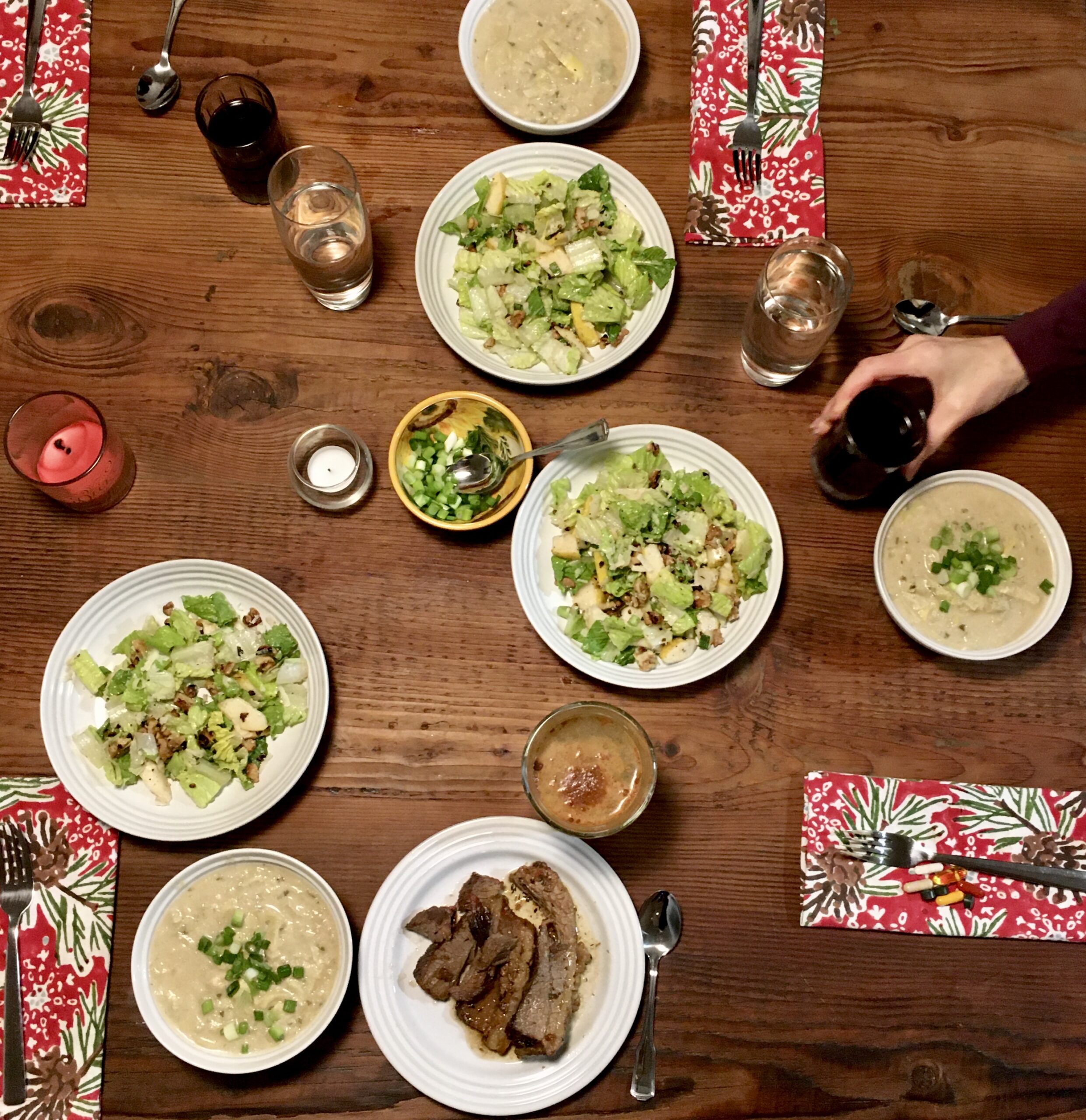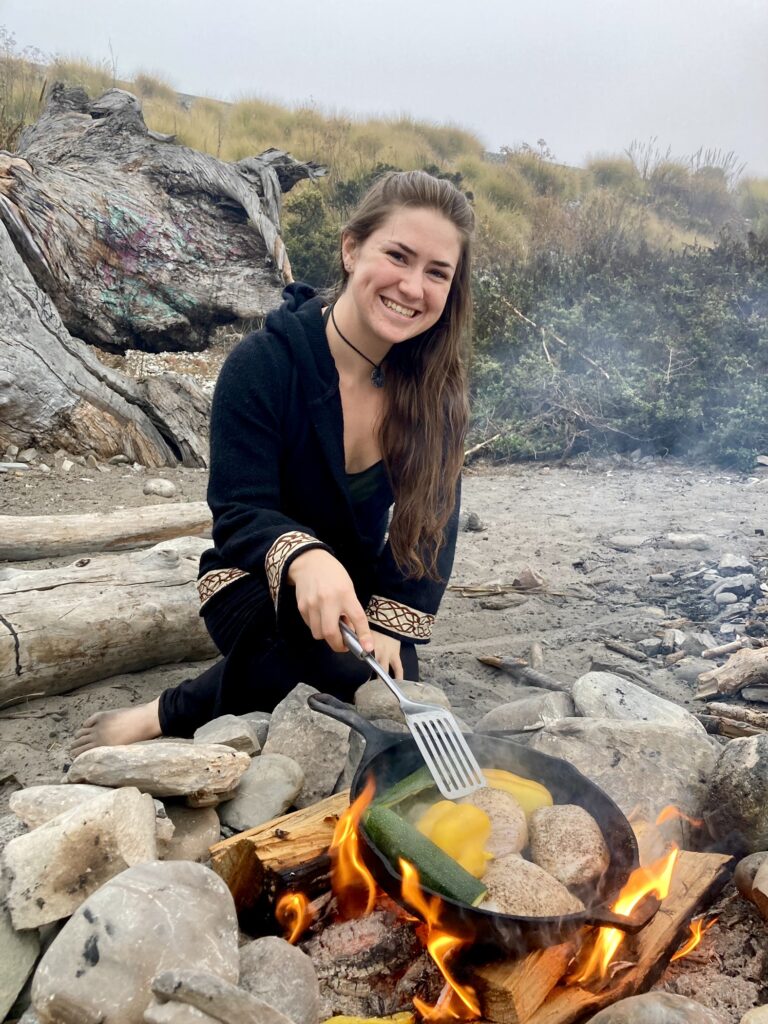Overcome Your Gut + Digestive Issues With Ancestral Nutrition
9 Tips For A Healthy Strong Digestion

Digestive and gut health issues have become more and more common over the last several decades.
As humanity shifts further away from an ancestral lifestyle and closer to a life of high stress, high toxin exposure, and unhealthy food it’s no surprise our digestive systems are suffering.
Our guts are being exposed to more chemicals, pesticides, pharmaceuticals, heavy metals, oxidized fats, and plant toxins than ever before. These substances cause a lot of damage to our gut lining and most of us aren’t giving our gut enough time to heal.
Chronic stress and busy lives keep us in the sympathetic (fight or flight) mode and don’t give us enough time in the parasympathetic (rest and digest) mode. The parasympathetic mode is necessary for proper digestion, nutrient absorption, and the repair of damaged tissues.
Therefore the typical modern lifestyle wreaks havoc on the gut and digestive system.
Some Signs Of An Unhealthy Digestion Include:
- Bloating
- Acid Reflux
- Indigestion
- Intestinal Cramps
- Constipation
- Diarrhea
- Gas
- Lack Of Hunger
- Skin Issues
- Decreased Immunity
- Unhealthy Food Cravings
- Fatigue
- Weight Loss
- Weight Gain
- Nutrient Deficiencies
- Body Odor
- Food Particles In The Stools
While A Healthy Digestion Looks Like:
- None Of The Symptoms Above
- Good Appetite (But not so strong that you get hangry or uncomfortable)
- Regular Eliminations That Aren’t Too Hard Or Soft (At least 1x everyday)
- Are In Tune With Your Hunger And Full Cues And Listen To Them
- Food Sits Light, But Is Satisfying
- Strong And Healthy Hair, Skin, And Nails
I know how frustrating digestive issues can be! My digestion is my Achilles’ heel of my health. I struggled with severe digestive issues (chronic constipation, daily bloating, lack of appetite, smelly gas, and painful intestinal cramps) for about 10 years and now I’ve finally gotten to a place where I’ve fully overcome these symptoms and healed my gut and digestive system!
These tips I’m about to share with you have made a huge difference (as in a here’s your life back kind of difference) for myself and countless others.
9 Tips For A Healthy Strong Digestion
1) Eat Easy To Digest Foods
Warm, well cooked, and soft foods are generally much easier to digest than cold, heavy, and tough foods. Animal foods like meat and eggs are also easier on the gut and digestive system. Therefore you want to eat more foods like this to aid your digestive health.
Some examples of easy to digest meals are:
- Meat And Veggie Soup (Like Tom Kha Gai)
- Ground Beef And Veggie Fried Rice
- Thai Duck Curry
- Ham And Veggie Frittata
- Chuck Roast
And some examples of hard to digest foods are:
- Cold Smoothie Bowl
- Sandwich
- Ice Cream
- Raw Veggies And Hummus
I’m not saying to never eat the later, but rather to make a majority of your food the former, easier to digest foods. Also try to only have the harder to digest foods when your digestion is strong.
2) Don’t Overdo The Plants
Plants (especially grains, legumes, nuts, seeds, and dark leafy greens) are high in plant toxins like lectins, oxalates, polyphenols, and phytates.
Plants just like animals don’t want to be eaten, but they can’t fight or run away, so they create toxins that are stored in the plant (in highest concentration in the seeds, then stems and leaves, and hardly any in the fruit or roots). This is why most plants in the wild are poisonous to us!
We can however tolerate some plant toxins, but in excess they cause severe digestive issues, leaky gut, autoimmune disease, kidney stones, nutrient deficiencies, hormone dysfunction, and more!
Therefore it’s important to limit consumption of grains, legumes, nuts, seeds, and dark leafy greens. And when we do consume these, it’s important to prepare them properly (soak, sprout, cook, roast, or ferment) to decrease the plant toxins and make these foods easier to digest.
It should also be noted that the high fiber content in most plants can also be hard on the gut and digestion (for more info about this check out my article on fiber and if you want to learn more about plant toxins you can check out this article).
3) Get Meal Timing Right
The main ideas here are to give your digestive system a rest and time to repair and to eat when your digestion is strongest (midday). To do this, I recommend waiting at least 3 hours between meals with no snacks or drinks with Calories between these meals. This way you can be sure you’ve fully digested the food from your previous meal and given your digestive system a little rest before eating more.
I also recommend that you don’t eat right when you get up or right before bed, for your digestion is typically weaker then and strongest in the middle of the day. There is no set time or rule for this, but I encourage you to mess around with this and figure out what works for you. For example I eat about 4 hours after getting up and stop eating about 3.5 – 4.5 hours before bed.
I find that if I eat really late, like an hour before bed, it will often sit like a rock in my stomach. And the next morning that rock will still be there. I know everybody is different, but I have found that eating late really doesn’t agree with my body or digestion.
Also, if you’d like to incorporate some intermittent fasting in, I think that can be very beneficial as well! And I think eating about 3-4 meals a day, around the same times each day typically works well for most people. By eating the same amount of meals around the same time each day, we can train our bodies to expect (and get hungry for) each meal and actually start preparing for digestion.
4) Eat Mindfully
I also find it helpful to slow down and enjoy my meals. To stop whatever it is that I am doing and focus on eating. To take a few deep breaths before eating, sit up straight for my meal, and to chew my food thoroughly. This brings my body into the parasympathetic or “rest and digest” mode. While in the parasympathetic mode, your body gives more blood to your digestive system in order to help digest your food.
I also find it helpful to continue to rest and sit up straight for at least 10 minutes after I eat. This allows my body to continue to focus on digesting instead of running around or what not. It also helps my food move through my digestive system quicker, as apposed to laying down, which prevents bloating and acid reflux.
Taking a little walk after this and de-stressing in general can be helpful as well.
5) Choose Drinks And Drink Timing Wisely
If drinking with your meal, you want to have something a little acidic like hot water with lemon, apple cider vinegar drink, or sparkling limeade; or something hot like tea, coffee, or bone broth (bone broth has extra gut healing properties due to its high collagen content too). Cold drinks are generally hard on the digestion and best avoided.
It’s also not great to drink plain water with your meal (or 30 minutes before or after your meal) because it can dilute your stomach acid, making it more difficult to digest your food. That’s why acidic drinks like the ones I mentioned above are preferred with meals. However plain water is great in between meals.
6) Listen To Your Body
Your body is really smart so really tune into what it’s telling you and follow it! This level of intuition takes practice, so be patient if you don’t get it right away.
Listen for hunger and full cues. These will help you to eat when you’re hungry and stop when you’re full. Really try to avoid eating when you’re not hungry or when you’re already full. Your body is telling you not to eat for a reason (often times that is you’ve already eaten enough, or you’re too stressed to eat right now). Ignoring your body could lead to weight gain, bloating, poor nutrient absorption, build up of ama (Ayurvedic term for mucus and toxins), and weakening of your digestion.
Another element of this is listening to your cravings. However this one is conditional because if you’re out of balance and aren’t in a healthy eating routine your cravings could easily be disordered. For example, if you eat a lot of sweets and you’re craving sugar, it doesn’t mean your body needs sugar, it means you’re addicted to sugar.
However, if you’re coming from a healthy place, your cravings can be very helpful. Your cravings will often align with the seasons, what your body needs (nutritionally), and what your digestion can handle.
7) Keep Things Moving
By this I mean have at least 1 bowel movement everyday! This is so important for our digestive system because it’s the very last part and if the colon gets backed up, everything upstream does too! Which in turn slows down digestion.
If you’re having trouble going daily, try to go around the same time every morning (ideally after breakfast). Pick a time when you can relax so not 10 minutes before you have to rush off to work. To train your body to go around then, sit on the toilet at that time for 10-15 mins everyday for 2 weeks, regardless of if you have to go or not. Eventually, it will start to become a habit.
Sitting in a squat like position where your knees are above your hips and your legs are wide, can also be very helpful since it aligns your intestines properly. Also reading or going on your phone can also help you to relax.
You can also try:
- Staying hydrated (getting plenty of water and minerals)
- Exercising and moving your body regularly
- Drinking coffee in the morning
- Taking a magnesium supplement at night
- Decreasing fiber intake (fiber adds bulk which sometimes makes stools too large and difficult to pass)
- Doing an enema (instructions here)
8) Avoid Toxins
Now a days we are exposed to so many toxins in our environment, food, tap water, cleaning and beauty products, plastic packaging, and more. These toxins can cause many health problems including damage to the gut and digestion.
Therefore it’s important to avoid toxins as well as cleanse from them. And here’s some tips on how to do that:
- Get a quality water filter (more info here)
- Buy organic
- Avoid plastic packaging, tupperwares, and water bottles as much as possible
- Detox and cleanse from time to time (In Depth Guide On How To Detox And Cleanse here)
- Get or make clean beauty and cleaning products
9) Exercise
I love exercising and training my body for so many reasons, but one of those reasons is that it improves my digestion. Moving my body always seems to make everything flow and function better. It helps me eliminate regularly, it boosts my metabolism, and stimulates my appetite. Altogether improving my digestion.
P.S. If you’re tired of dealing with gut and digestive issues like bloating, constipation, feeling backed up and heavy in your abdomen, acid reflux, and/or other symptoms, and you want a step by step process on how to finally overcome these symptoms and reclaim your vitality and health, then click here to schedule a free 15 minute call with me to see how I can help!

